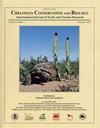波多黎各西部棱皮龟(Dermochelys coriacea)巢的菌丝真菌多样性
IF 0.8
4区 生物学
Q3 ZOOLOGY
引用次数: 17
摘要
摘要:本研究描述了波多黎各Mayagüez-Añasco Bay Coast (MABC)棱皮海龟巢和卵的菌丝真菌多样性。比较了棱皮龟筑巢季节之前、筑巢季节期间和巢孵化季节的条件。在革螨筑巢季节前,经单因素方差分析,真菌群落沿MABC呈正态分布(p = 0.098)。以曲霉属(Aspergillus)最多,为0.15,其次为枝孢霉属(Cladosporium),为0.09,曲霉属(Curvularia)为0.08。产卵时以青霉菌最多(0.15),其次是枝孢菌(0.11)、曲霉菌(0.11)和镰刀菌(0.07)。没有真菌从筑巢棱皮龟的产卵器样本中分离出来。在孵化季节,从孵化巢的沙子和失败的卵中评估真菌多样性。在孵化的巢沙中分离到的镰刀菌最多(0.57),是唯一从失败卵内部分离到的菌种。真菌丰度与巢内失败卵数呈极显著正相关(r = 0.853, p < 0.001)。这是第一次尝试研究波多黎各与D. coriacea巢穴和卵相关的真菌多样性。本文章由计算机程序翻译,如有差异,请以英文原文为准。
Mycelial Fungal Diversity Associated with the Leatherback Sea Turtle (Dermochelys coriacea) Nests from Western Puerto Rico
Abstract This work describes the mycelial fungal diversity associated with leatherback sea turtle nests and eggs from Mayagüez-Añasco Bay Coast (MABC), Puerto Rico. Comparisons are made of conditions previous to leatherback nesting season, during leatherback nesting season, and during nest hatching season. Prior to Dermochelys coriacea nesting season, the fungal community along the MABC showed a normal distribution (p = 0.098) by One-Way ANOVA. We found that Aspergillus was the most frequent genus (0.15), followed by Cladosporium (0.09) and Curvularia (0.08). At the time of oviposition, Penicillium was the most frequent isolate (0.15), followed by Cladosporium (0.11), Aspergillus (0.11), and Fusarium (0.07). No fungi were isolated from nesting leatherback's ovipositor samples. During hatching season, fungal diversity was evaluated from the sand of hatched nests and from failed eggs. Fusarium solani was the most frequent isolate (0.57) from hatched nest sand and was the only species isolated from the interior of failed eggs. A strong positive correlation was obtained between fungal abundance and the number of failed eggs in the nests (r = 0.853, p < 0.001). This was the first attempt to study fungal diversity associated with D. coriacea nests and eggs in Puerto Rico.
求助全文
通过发布文献求助,成功后即可免费获取论文全文。
去求助
来源期刊
CiteScore
1.70
自引率
14.30%
发文量
17
审稿时长
>12 weeks
期刊介绍:
Chelonian Conservation and Biology is a biannual peer-reviewed journal of cosmopolitan and broad-based coverage of all aspects of conservation and biology of all chelonians, including freshwater turtles, marine turtles, and tortoises. Manuscripts may cover any aspects of turtle and tortoise research, with a preference for conservation or biology. Manuscripts dealing with conservation biology, systematic relationships, chelonian diversity, geographic distribution, natural history, ecology, reproduction, morphology and natural variation, population status, husbandry, community conservation initiatives, and human exploitation or conservation management issues are of special interest.

 求助内容:
求助内容: 应助结果提醒方式:
应助结果提醒方式:


